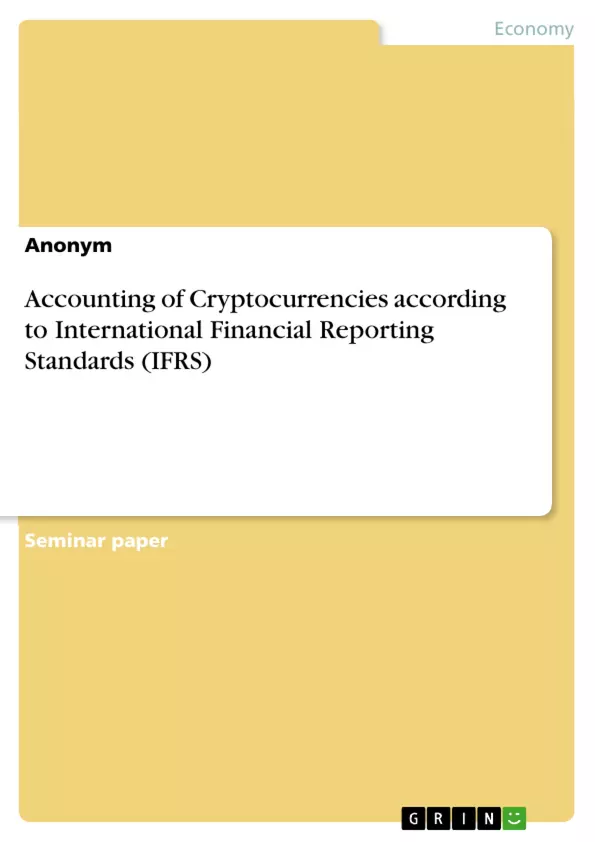This paper will describe if cryptocurrency can be handled as cash or other assets in the IFRS. By now, it is commonly known that cryptocurrencies are virtual currencies. Cryptocurrencies are not linked to a central banking system or any other authority. Among others, those facts lead to several challenges for a company that owns cryptocurrencies.
Even if the term cryptocurrency and some features are generally known, this assignment will first define what a cryptocurrency is and the origin of it. This is necessary to understand the complexity of this topic and get an impression about the challenges the finance sector as well as accounting and controlling of companies are facing. In the next part, this assignment will consider which accounting standards might be applicable for cryptocurrencies. In the last stage, the assignment will give a deeper insight into the accounting of cash and cash equivalents compared to cryptocurrencies.
Inhaltsverzeichnis (Table of Contents)
- Introduction
- What is a cryptocurrency?
- Where does the cryptocurrency come from?
- What kind of cryptocurrencies exist?
- Accounting of cryptocurrencies according to IFRS
- Difference between cash and cryptocurrencies
- Conclusion
Zielsetzung und Themenschwerpunkte (Objectives and Key Themes)
This assignment aims to provide an overview of accounting for cryptocurrencies according to International Financial Reporting Standards (IFRS). It examines the nature and origin of cryptocurrencies, highlighting the complexities they present for finance, accounting, and controlling. The assignment also analyzes the potential accounting standards applicable to cryptocurrencies and compares the treatment of cash and cash equivalents with that of cryptocurrencies.
- Definition and origin of cryptocurrencies
- Accounting standards for cryptocurrencies under IFRS
- Comparison of cash and cryptocurrency accounting
- Challenges of accounting for cryptocurrencies
- Current discussions and developments in the field
Zusammenfassung der Kapitel (Chapter Summaries)
- The introductory chapter defines cryptocurrency as a virtual currency not linked to a central banking system, highlighting the unique challenges it presents for financial statement presentation. The chapter reviews the discussions surrounding cryptocurrency accounting by the Australian Accounting Standards Board (AASB), the Accounting Standards Advisory Forum (ASAF), and the International Accounting Standards Board (IASB).
- This chapter defines what a cryptocurrency is and explores its origins. It emphasizes the complexity of cryptocurrencies and the challenges they pose for finance, accounting, and controlling within companies.
- This chapter examines various types of cryptocurrencies, offering further insight into the diversity and complexities within this digital asset class. It complements the understanding of the unique challenges presented by cryptocurrencies in accounting and financial management.
- This chapter delves into the accounting of cryptocurrencies according to IFRS, providing an overview of the applicable standards and their implications for financial statement presentation.
- This chapter compares the accounting treatment of cash and cryptocurrencies, highlighting the key differences and challenges arising from the unique nature of cryptocurrencies.
Schlüsselwörter (Keywords)
Cryptocurrencies, IFRS, Accounting Standards, Cash Equivalents, Digital Assets, Financial Reporting, Virtual Currency, Central Banking System, Accounting Challenges, Financial Statement Presentation.
Frequently Asked Questions
Can cryptocurrencies be accounted for as cash under IFRS?
The assignment explores this complexity, noting that while they are virtual currencies, their lack of link to central banks creates significant accounting challenges compared to traditional cash.
What are the main challenges for companies owning cryptocurrencies?
Key challenges include valuation, classification within financial statements, and navigating the evolving standards set by boards like the IASB and AASB.
Which IFRS standards might apply to digital assets?
The paper discusses various standards that could potentially apply, depending on whether the cryptocurrency is held for sale, as an investment, or as an intangible asset.
What is the difference between cash equivalents and cryptocurrencies?
Cash equivalents are highly liquid and stable, whereas cryptocurrencies often lack legal tender status and exhibit high volatility, making their classification distinct in accounting.
Why is the origin of cryptocurrency relevant for accounting?
Understanding the decentralized nature and technological origin is crucial to grasp the complexity and the lack of traditional authority governing these assets.
- Quote paper
- Anonym (Author), 2019, Accounting of Cryptocurrencies according to International Financial Reporting Standards (IFRS), Munich, GRIN Verlag, https://www.grin.com/document/1383490



